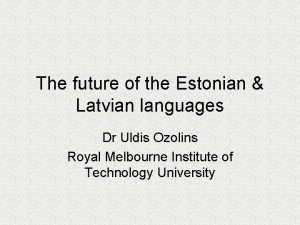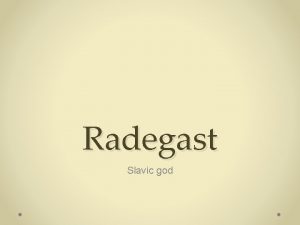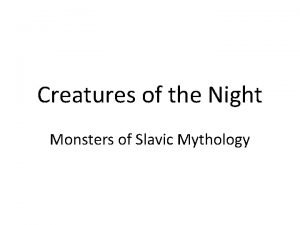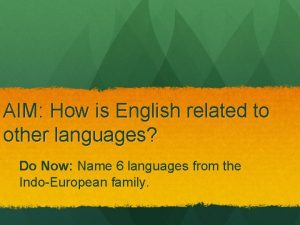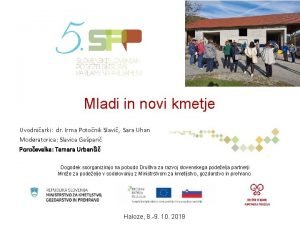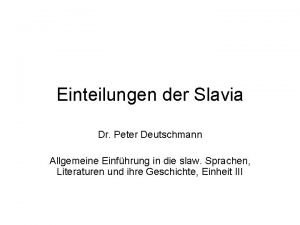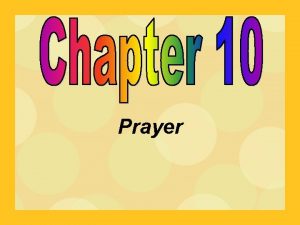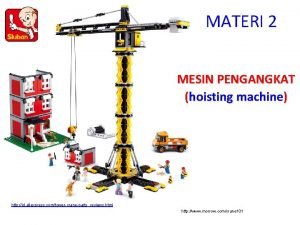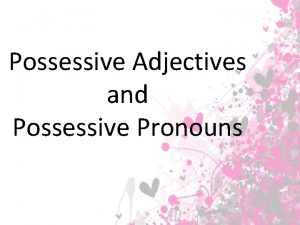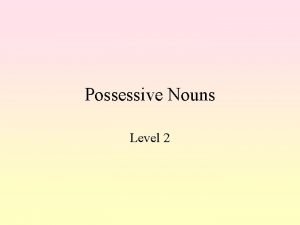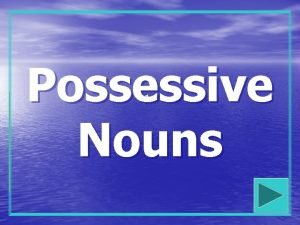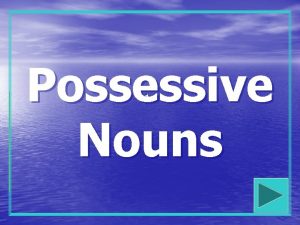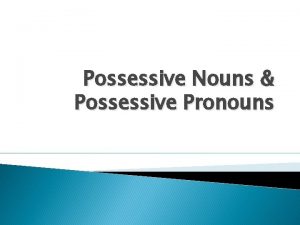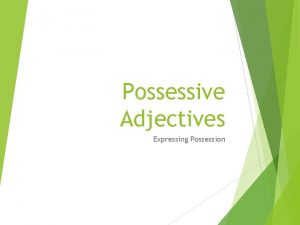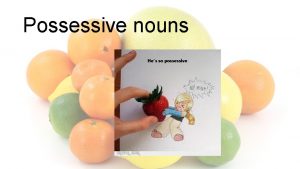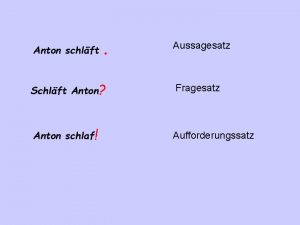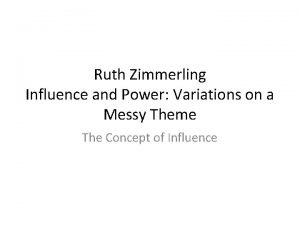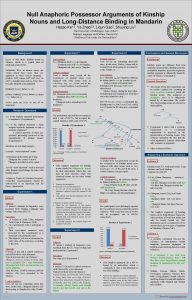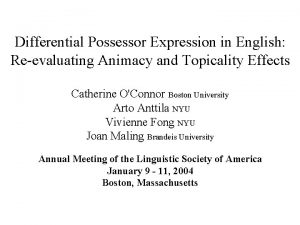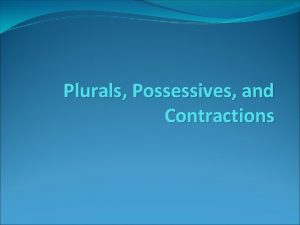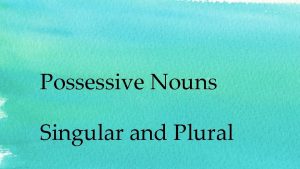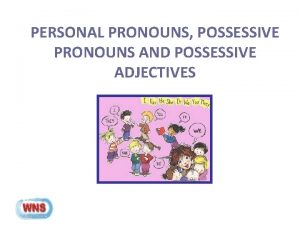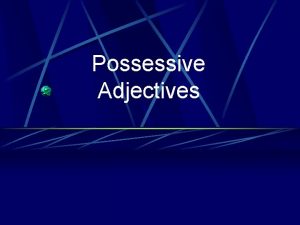Possessor Raising and Slavic Possessive Clitics Anton Zimmerling











![Applicative morphemes Hungarian: an applicative auxiliary element is added [Szabolcsi 1983, Szabolcsi 1994] Mari-nak Applicative morphemes Hungarian: an applicative auxiliary element is added [Szabolcsi 1983, Szabolcsi 1994] Mari-nak](https://slidetodoc.com/presentation_image_h2/d394f75bcd632c72fc8db518c8e593ad/image-12.jpg)
![Case Marking on the Possessor Corean: [Doo-Won Lee 2004: 239] а. [DPKim kyoswu kacok] Case Marking on the Possessor Corean: [Doo-Won Lee 2004: 239] а. [DPKim kyoswu kacok]](https://slidetodoc.com/presentation_image_h2/d394f75bcd632c72fc8db518c8e593ad/image-13.jpg)
![Slavic Languages Pronominal clitics [Franks & King 2000], [Зализняк 2008]. Pronominal Dative clitics have Slavic Languages Pronominal clitics [Franks & King 2000], [Зализняк 2008]. Pronominal Dative clitics have](https://slidetodoc.com/presentation_image_h2/d394f75bcd632c72fc8db518c8e593ad/image-14.jpg)


![Bulgarian Alienable possession а. Тя намери=ли [DP ужасни-те=си грешки]? She found. PST 3. SG. Bulgarian Alienable possession а. Тя намери=ли [DP ужасни-те=си грешки]? She found. PST 3. SG.](https://slidetodoc.com/presentation_image_h2/d394f75bcd632c72fc8db518c8e593ad/image-17.jpg)
![Bulgarian Inalienable possession (c) Той =ми =се изкряска [PP в [DP ухото ]] he Bulgarian Inalienable possession (c) Той =ми =се изкряска [PP в [DP ухото ]] he](https://slidetodoc.com/presentation_image_h2/d394f75bcd632c72fc8db518c8e593ad/image-18.jpg)








- Slides: 26

Possessor Raising and Slavic Possessive Clitics Anton Zimmerling (MGGU/RGGU) meinmat@yahoo. com http: //antonzimmerling. wordpress. com//

SUMMARY The paper discusses syntactic features of Slavic possessive clitics and Slavic constructions with the so called ‘Possessor Raising’. I am proving that only a minority of Slavic languages have true phrase -level (NP-level or DP-level) possessive clitics and arguing against a generalized syntactic account of all Slavic constructions with Possessor Raising. In descriptive terms the term ‘Possessor Raising’ refers to a quasisynonymic semantic transformation when a phrase-level possessive operator located in an NP/DP and expressed by a clitic/free pronoun/NP is arranged as an argument of the clausal predicate. I am arguing that a different location of a possessive operator may both change syntactic structure or preserve it depending on the value morphosyntactic parameters assume in a given language. 2

Possessor Raising and Possessive Shift Possessor Raising is a operation preserving syntactic structure: it shown different stages of syntactic derivation of one and the same sentence. Possessive Shift = alternation of different syntactic structures. 3

Type A languages: Phrase-level possessive operators and clause-level possessive operators are marked with different morphological cases. E. g. Russian phrase-level possessives are genitives while Russian clause-level possessives are datives, cf. 1) Rus. Ona ne [NP doch’ Petrova Gen/ego Gen doch’] ‘She is not Petrov’s daughter/his daughter’ ~ 2) Ona emu-Dat ne docj/ Petrovu-Dat ne doch’’ For this group of languages the analysis in terms of PR does not make much sense. 4

Type B languages Possessor Shift is bound to the use of pronominal clitics which are marked by the same overt case (dative) both on the phrase-level and on the clause-level. For this group of languages, a Raising analysis of clausal possessive forms remains possible. In Modern Serbo-Croatian, dative possessives in clausal 2 P are marginally acceptable, cf. Pennington (2010), but phrase-level dative possessives in SC are ungrammatical. 5

Type C languages Modern Bulgarian and Macedonian both have DP -level dative clitics – cf. Mišeska Tomić (2004), Franks, Junghanns & Law (2005) and mechanisms allowing for extracting dative clitics out of DP and placing them in clausal-second position (2 P) – a position typically hosting Slavic argument and reflexive pronominal clitics, cf. Dimitrova. Vulchanova (1999), Franks & King (2008), Zimmerling (2008), Kosta & Zimmerling (2011) 6

Problems and solutions The two oldest Slavic idioms – Old Church Slavonic (OCS) and Old Northern Russian (ONR) – exemplify two extremes: ONR completely lacked dative possessives, while in OCS they were common both in clausal 2 P and on the phrase-level. Following Kosta & Zimmerling (2011) I am claiming that the majority of Slavic languages only have clauselevel possessives and pattern them with argument dative clitics. 7


Quasipossesivity: the form Two metalinguistic uses. 2 a. A possessive construction is used for expressing different meanings. [Селиверстова 1990], [Циммерлинг 2000]. Cf. У меня есть карта и У меня есть подозрение, что P. O. Icel. mér er ván cf. Rus. “у меня (букв. мне) есть надежда”; *mér er húsit intended: “I have a house”. O. Icel. ég hefi ván lit. «I have (a) hope» ; ég hefi húsit lit. «I have a house» . 9

Quasipossessivity: the semantics 2 b. Possessive and non-possessive relations between some predicate arguments are expressed simultaneously. 2 b 1. On the semantic level, cf. [Грамматика 1980]. Rus. У нее деньги в банке. (Locative Relation + Possessive Relation). Rus. У Ивана в сарае радиостанция смонтирована (Locative Relation + Possessive Relation + Agentive Relation, cf. е – ср. Rus. Иван смонтировал радиостанцию в сарае). У меня в квартире пол не метен (Locative Relation + Agentive Relation). 10

![Applicative morphemes Hungarian an applicative auxiliary element is added Szabolcsi 1983 Szabolcsi 1994 Marinak Applicative morphemes Hungarian: an applicative auxiliary element is added [Szabolcsi 1983, Szabolcsi 1994] Mari-nak](https://slidetodoc.com/presentation_image_h2/d394f75bcd632c72fc8db518c8e593ad/image-12.jpg)
Applicative morphemes Hungarian: an applicative auxiliary element is added [Szabolcsi 1983, Szabolcsi 1994] Mari-nak a kalap-ja-i “Mary’s hats”, Cf. Rus. “Машины шляпы» , «шляпы Маши» М. – Dat. the hat-Poss. 3 Mari-nak van-nak kalap-ja-i “Mary has some hats”, Cf. Rus. «У Маши есть шляпы» . М. – Dat. Be-3 Pl. hat-Poss. 3 12
![Case Marking on the Possessor Corean DooWon Lee 2004 239 а DPKim kyoswu kacok Case Marking on the Possessor Corean: [Doo-Won Lee 2004: 239] а. [DPKim kyoswu kacok]](https://slidetodoc.com/presentation_image_h2/d394f75bcd632c72fc8db518c8e593ad/image-13.jpg)
Case Marking on the Possessor Corean: [Doo-Won Lee 2004: 239] а. [DPKim kyoswu kacok] -i «Professor Kim’s family» K. professor family –Nom b. [DP Kim kyoswu ton]- i «Professor Kim’s money» K. money - Nom c. Kim kyoswu-ka/eykye kacok-i iss-ta «Professor Kim has a family» K. professor-Nom/Dat family-Nom exist-Dec d. *[DPKim kyoswu kacok] –i iss-ta f. Kim kyoswu-ka/eykye ton-I iss-ta. money» g. *[DPKim kyoswu toni] –i iss-ta «Professor Kim has 13
![Slavic Languages Pronominal clitics Franks King 2000 Зализняк 2008 Pronominal Dative clitics have Slavic Languages Pronominal clitics [Franks & King 2000], [Зализняк 2008]. Pronominal Dative clitics have](https://slidetodoc.com/presentation_image_h2/d394f75bcd632c72fc8db518c8e593ad/image-14.jpg)
Slavic Languages Pronominal clitics [Franks & King 2000], [Зализняк 2008]. Pronominal Dative clitics have non-trivial properties – they can be used both on the NP/DP-level and on the clause-clevel and express the Possessive Relation. NP/DP-level Posssesive Clitics are attested in Bulgarian and Macedonian [Franks, Junghanns, Law 2005]. Raising of phraselevel Possessive clitics and lowering of clause-level Possessive clitics are blocked or hampered [Pennington 2010] затруднен [Kosta, Zimmerling 2011]. Two possible analyses of Bulgarian Possessive clitics – Possessive Raising is possible [Schürсks, Wunderlich 2004]. – Possessive Raising is only possible in some constructions expressing alienable possession [Cinque & Krapova 2011]. 14

Russian: No Possessor Raising NP-level Russian non-agreeing possessive determiners are marked with Genitive, clause-level Russian non-agreeing possessive determiner are marked with Dative. In this situation, Possessive Raising cannot be analyzed as on operation preserving syntactic structure. Rus. Oна не [NP дочь Петрова-Gen/его-Gen дочь] ~ Она не дочь Петрову Dat. /ему-Dat не дочь. “She is not Petrova’s daughter” Russian lacks NP/DP-level possessive determiners in the Dative Case. а. Я себе I не враг. b. *Я встретил врага себе. I met REFL. DAT. not enemy REFL. DAT 15

Old Russian had both clause-level possessive clitics (merged in 2 P according to Wackernagel’s law, normally - after the first phonetic word), and NP-level possessive clitics attached to nominal heads. а. O. Rus. что воздамъ=ти. PP противоу [NP благодѣянию=ти]? (Ипат. [1199], л. 244). What render. PRS. 1 SG you. DAT. 2 SG. for benefaction you. DAT. 2 SG. b. брата=ти Романа Богъ поялъ (Ипат. [1180], л. 217). Brother. ACC. SG. you. DAT. 2 SG. Roman. ACC. SG. God took. PRF. 3 SG. M. “God took your brother Roman from you”, cf. Rus. ‘Бог взял у тебя (твоего) брата Романа’ OR ‘Бог взят твоего брата Романа (у тебя)’. 16
![Bulgarian Alienable possession а Тя намерили DP ужаснитеси грешки She found PST 3 SG Bulgarian Alienable possession а. Тя намери=ли [DP ужасни-те=си грешки]? She found. PST 3. SG.](https://slidetodoc.com/presentation_image_h2/d394f75bcd632c72fc8db518c8e593ad/image-17.jpg)
Bulgarian Alienable possession а. Тя намери=ли [DP ужасни-те=си грешки]? She found. PST 3. SG. Q horrible-the REFL. DAT. mistakes «Did she find her terrible mistakes? » b. Тя намери=ли=си [DP ужасни-те ___грешкиi]? She found. PST 3. SG. Q REFL. DAT. horrible-the mistakes 17
![Bulgarian Inalienable possession c Той ми се изкряска PP в DP ухото he Bulgarian Inalienable possession (c) Той =ми =се изкряска [PP в [DP ухото ]] he](https://slidetodoc.com/presentation_image_h2/d394f75bcd632c72fc8db518c8e593ad/image-18.jpg)
Bulgarian Inalienable possession (c) Той =ми =се изкряска [PP в [DP ухото ]] he me. DAT. SG. REFL. ACC shouted. PST. 3 SG. in ear. the ‘He shouted in my ear’. (d) Той=се изкряска [PP в [DP ухото=ми ]] ‘the same’ In (c) the clitic =ми is an argument of the main clausal predicate. It has the meaning of the Benefactor/Malefactor, in (d) the clitic =ми is a DPlevel element, the DP being part of a PP. 18

Bulgarian No extraction out of PPs seems to be possible. е. *Аз=и мисля [PP -за [DP oчите __]] I her. DAT. 3 SG. F. think. PRS. 1 SG. for eyes. the intended: ‘I am thinking of her eyes’. Consequently, in examples like (c), we do not have any extraction either: the possessive clitic is basegenerated in the main clause. c. Той =ми =се изкряска [PP в [DP ухото ]] 19

Conclusions Is there Possessor Raising in Russian? No, unless one postulates a special syntactic conception it order to find it. Is there Possessor Raising in UG? Yes, in some Cases Possessor Raising is possible as a purely syntactic operation, in other cases it pertains to semantics and one must postulate a synonymy of different possessive (or quasi -possessive constructions). For this case we reserve the notion Possessor Shift. Universal semantic relations correspond to similar but not identical syntactic patterns. . 20

Acknowledgments The paper is prepared with financial support of the Russian Foundation for the Humanities (RGNF), project 11 -04 -00282 a “Typology of morphosyntactic parameters”. 21



REFERENCES (3) Cinque, Guglielmo and Ilyana Krapova. (2011) “The Case for Genitive Case in Bulgarian”. Lilia Schürcks, Urtzi Etxeberria, Anastasia Giannakidou and Peter Kosta (eds. ) The Structure of NP and Beyond (Studies in Generative Grammar). Berlin, London: de Gruyter (to appear). Don-Won Lee. Possessor-Raising in Existential Constructions. In: Studies in Generative Grammar, Vol. 14, No. 2, (2004), 235 -242. Szabolcsi, Anna. The Possessor that Ran away from Home. The Linguistic Review 3: 89 -102 (1983). Baker, Mark. Incorporation: A theory of grammatical function changing. Chicago: The University of Chicago Press. 1988. Den Dikken, Marcel. Predicate Inversion in DP. In: Possessors, Predicates and Movement in the Determiner Phrase, ed. Artemis Alexiadou and Chris Wilder 177 -214. Amsterdam-Philhadelphia: John Benjamins, 1998. 24

REFERENCES (4) Lilia Schűrcks & Dieter Wunderlich. (2003). “Determiner. Possessor Relation in the Bulgarian DP”. Martine Coene & Yves D'hulst (eds. ) From NP to DP. Volume 2: The expression of possession in noun phrases. Amsterdam: Benjamins 2003, 121 -139. Franks, Steven, Uwe Junghanns and Paul Law. (2005) “Pronominal Clitics in Slavic”. Journal of Slavic Linguistics, 12 (2004) 1 -2, 3 -36. Franks, Steven & Tracy King. (2000) A handbook of Slavic clitics. New York: Oxford University Press. Mišeska Tomić, Olga. (2004) “The South Slavic Pronominal Clitics”. Journal of Slavic linguistics, 12 (1 -2): 213 -48, 2004. 25

REFERENCES (5) Kosta, Peter & Anton Zimmerling. (2011). Slavic Clitic Systems in a Typological Perspective. Lilia Schürcks, Urtzi Etxeberria, Anastasia Giannakidou and Peter Kosta (eds. ) The Structure of NP and Beyond (Studies in Generative Grammar). Berlin, London: de Gruyter (to appear ). Pennington, James J. (2010). Kombinovanje objekta adnominalnog posesivnog dativa s dopunama glagola u jednoj klauzi u bosansko hrvatsko srpsko crnogorskom. University of Ohio. Ms. 26
 Is latvia slavic
Is latvia slavic Byzantine definition
Byzantine definition Radegast slavic god
Radegast slavic god Where did the slavs come from
Where did the slavs come from Werewolf slavic mythology
Werewolf slavic mythology Germanic romance slavic
Germanic romance slavic Germanic romance slavic
Germanic romance slavic Balto slavic languages
Balto slavic languages Irma potočnik slavič
Irma potočnik slavič Slavic langauge
Slavic langauge Prayer is the raising of the heart and mind to god
Prayer is the raising of the heart and mind to god Parts of extension ladder firefighter
Parts of extension ladder firefighter What are votive figures
What are votive figures Raising the mary rose
Raising the mary rose Describe preindustrial societies of horticulturalists
Describe preindustrial societies of horticulturalists Tohru raising the floor
Tohru raising the floor Biological raising agents examples
Biological raising agents examples Nadar raising photography to the height of art
Nadar raising photography to the height of art Awareness raising tv spot
Awareness raising tv spot Raising machine
Raising machine Thirteen equals one
Thirteen equals one Raising an auto in a service station
Raising an auto in a service station Unit 9 raising finance answers
Unit 9 raising finance answers Shurtleff guideposts
Shurtleff guideposts American college of osteopathic pediatricians
American college of osteopathic pediatricians Raising a godly child in an ungodly world
Raising a godly child in an ungodly world Raising capital definition
Raising capital definition
